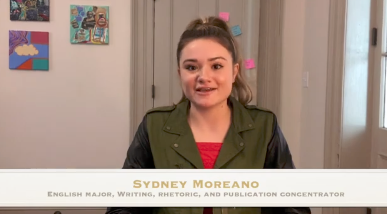Writing, Rhetoric, and Publication
The Writing, Rhetoric, and Publication (WRP) Program addresses three areas of study:
- content-making and content-delivery
- technical writing and editing
- writing, literacy, and rhetorical studies
Each area of study includes relevant writing theory and opportunities to produce writing for multiple audiences and in multiple media.
Through these areas of study, WRP students will gain experience doing:
- document design
- technical writing and editing
- social media marketing
- sound, image, and video editing
- usability testing
- search engine optimization
- content strategy
- copywriting for print and web
Prospective students can visit the WRP Showcase, a collection of student work, to get a sense of the kinds of things you will produce in your WRP courses.
WRP at CofC
You may be wondering what you can do with WRP. We’re here to help. And, we’ve made helping you secure a job in a field that interests you our first priority.
-
The Writing, Rhetoric, and Publication (WRP) Minor
We designed this minor to provide you with different kinds of opportunities to deepen your practice in writing for your own purposes and audiences.
WRP minors deepen what they know and can do as writers through coursework in digital writing, editing, and design; technical writing and editing; writing, rhetoric, and literacy. In other words, it will help you gain a competitive edge, particularly if you plan to work in one of the content professions.
- Content creation
- Content strategy
- UX/UI consulting
- Web/Social content creation
- Web/Social content strategy
- Technical/Production editing
-
The Writing, Rhetoric, and Publication (WRP) Concentration
The B.A. in English with a WRP concentration combines reading, interpretation, and creative writing. You’ll encounter a sustained engagement with writing in different media (sound, visuals, and alphabetic text) for a variety of audiences and purposes.
You will not only learn how to effectively write, edit, design, and deliver texts for print and screen. You’ll also develop a useful and rich understanding of writing, rhetoric, and literacy to navigate 21st century life.
Coursework in the WRP concentration is a good fit for you if you want to work in:
- the content professions
- the publishing industry
- as a professional/technical editor
Student Voices and Experiences
"The WRP program has added another layer to my knowledge base in the field of digital media and what I have learned in my communications classes. The courses I have taken are hands on and have allowed me to practice skills such as working with SEO, creating social media content, writing content for various audiences, creating podcasts and many others that I have been able to use in other classes and in internships. I love that I am able to take courses that provide me with practical skills I know I will use often in the future."
-Grace Samuelson, Communications Major and WRP Minor
"I chose this concentration in order to market some of my literary abilities to suit multiple professions. And while it has done this, the WRP concentration has also expanded my views on what it means to be literate, what it means to truly write within genres and what it means to read with intentionality. And I am a better writer, reader and consumer for it."
-Ryan Rothkopf, English Major and WRP Concentrator
Faculty Perspectives
A defining feature of professional, public, and private life in the 21st century is the ability to write messages in a range of media for different purposes and audiences. In other words, today's writers must be flexible, able to adapt to the demands of diferent writing contexts and writing media. The WRP program provides students with knowledge and practice to help them become more effective and flexible writers.
The WRP program offers students opportunities to learn more about who they are as writers and how writing happens online, in community settings, in workplaces, and elsewhere. Students gain experience with different writing genres and technologies that prepare them for careers in editing, publishing, marketing, and other writing-centered professions.
As Ashley Harvey, a WRP concentrator, has explained about the value of writing, "To be a better writer, you need to write every day. Write to express; write to inform; write to remember.’ WRP, indeed, helps students become better writers by studying theories about writing and by writing different genres for various venues."

